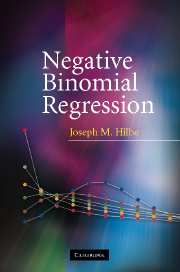Book contents
- Frontmatter
- Contents
- Preface
- Introduction
- 1 Overview of count response models
- 2 Methods of estimation
- 3 Poisson regression
- 4 Overdispersion
- 5 Negative binomial regression
- 6 Negative binomial regression: modeling
- 7 Alternative variance parameterizations
- 8 Problems with zero counts
- 9 Negative binomial with censoring, truncation, and sample selection
- 10 Negative binomial panel models
- Appendix A Negative binomial log-likelihood functions
- Appendix B Deviance functions
- Appendix C Stata negative binominal – ML algorithm
- Appendix D Negative binomial variance functions
- Appendix E Data sets
- References
- Author Index
- Subject Index
10 - Negative binomial panel models
Published online by Cambridge University Press: 05 June 2012
- Frontmatter
- Contents
- Preface
- Introduction
- 1 Overview of count response models
- 2 Methods of estimation
- 3 Poisson regression
- 4 Overdispersion
- 5 Negative binomial regression
- 6 Negative binomial regression: modeling
- 7 Alternative variance parameterizations
- 8 Problems with zero counts
- 9 Negative binomial with censoring, truncation, and sample selection
- 10 Negative binomial panel models
- Appendix A Negative binomial log-likelihood functions
- Appendix B Deviance functions
- Appendix C Stata negative binominal – ML algorithm
- Appendix D Negative binomial variance functions
- Appendix E Data sets
- References
- Author Index
- Subject Index
Summary
A basic assumption in the construction of models from likelihood theory is that observations in the model are independent. This is a reasonable assumption for perhaps the majority of studies. However, for longitudinal studies this assumption is not feasible; nor does it hold when data are clustered. For example, observations from a study on student drop-out can be clustered by the type of schools sampled. If the study is related to intervention strategies, schools in affluent suburban, middle-class suburban, middle-class urban, and below poverty level schools have more highly correlated strategies within the school type than between types or groups. Likewise, if we have study data taken on a group of individual patients over time (e.g., treatment results obtained once per month for a year), the data related to individuals in the various time periods are likely to be more highly correlated than are treatment results between patients. Any time the data can be grouped into clusters, or panels, of correlated groups, we must adjust the likelihood-based model (based on independent observations) to account for the extra-correlation.
We have previously employed robust variance estimators and bootstrapped standard errors when faced with overdispersed count data. Overdispersed Poisson models were adjusted by using different types of negative binomial models, or by extending the basic Poisson model by adjusting the variance or by designing a new log-likelihood function to account for the specific cause of the overdispersion.
Information
- Type
- Chapter
- Information
- Negative Binomial Regression , pp. 198 - 232Publisher: Cambridge University PressPrint publication year: 2007
Accessibility standard: Unknown
Why this information is here
This section outlines the accessibility features of this content - including support for screen readers, full keyboard navigation and high-contrast display options. This may not be relevant for you.Accessibility Information
- 1
- Cited by
